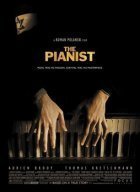
The Pianist Page #3
MOTHER:
What are we supposed to do with
the rest?
HALINA:
Deposit it in a bank. Blocked
account.
HENRYK:
Banks? Who'd be stupid enough to
deposit money in a German bank?
REGINA:
We could hide the money here in
the window frame.
FATHER:
No, no, no. I'll tell you what
we'll do. We'll use tried and tested
methods. You know what we did in
the last war? We made a hole in
the table leg and we hid the money
in there.
HENRYK:
And suppose they take the table
away?
MOTHER:
What d'you mean, take the table
away?
HENRYK:
The Germans go into Jewish homes
and they just take what they want,
furniture, valuables, anything.
MOTHER:
Do they?
FATHER:
Idiot! What would they want with a
table?
All look at the table: it's covered in stains and the veneer
is coming away at one end. A table like this?
He pokes his finger under the veneer. It snaps, revealing
bare wood beneath.
MOTHER:
What on earth are you doing?
HALINA:
There's a good place under the
cupboard.
HENRYK:
No, no. Listen, I've been thinking --
SZPILMAN:
That makes a change.
HENRYK:
You know what we do? We use
psychology.
SZPILMAN:
We use what?
HENRYK:
We leave the money and the watch
on the table. And we cover it like
this.
(covers it with the
newspaper)
In full view. The Germans will
search high and low, I promise
you, they'll never notice it.
SZPILMAN:
Of course they'll notice it. But
look--
(lifts the violin
fingerboard.)
This is a good place for something.
HENRYK:
A good place for what?
(to the others')
He's insane!
SZPILMAN:
Just shut up.
FATHER:
(overlapping)
My violin?
They all talk at once.
REGINA:
Quiet! Quiet! Order, please, order!
HALINA:
She's a lawyer, she likes order.
REGINA:
Listen, just listen. Let's come to
an agreement. We jam the money in
the window frame. The watch we
hide under the cupboard. And the
chain we put in the violin.
A brief silence.
FATHER:
Will I still be able to play?
SZPILMAN:
Let's find out.
They start to hide the things.
INT. WARSAW PHARMACY - DAY
Szpilman is on the public telephone, waiting for someone
to answer his call. Then:
SZPILMAN:
Jurek? Wladek Szpilman.
JUREK:
(filtered)
Wladek! How are you?
SZPILMAN:
Fine, we're fine, thank you, and
you?
JUREK:
(filtered)
Fine, we're fine in the
circumstances. But I can guess
what you've called about. There's
nothing we can do; they won't reopen
the station--
SZPILMAN:
(trying to interrupt)
Yes, I know, but Jurek, Jurek...
JUREK:
(filtered)
...not even music, nothing, no
radios for the Poles. But I'm sure
you'll find work, Wladek, a pianist
like you.
SZPILMAN:
Maybe, maybe not, but, Jurek, don't
be offended, I didn't call to
discuss my future career.
EXT. WARSAW STREET AND CAFE PARADISO - DAY
Szpilman and Dorota stroll along a tree-lined street with
bombed-out buildings and rubble. She flicks admiring, almost
loving glances at him as they walk and talk. And he is
smiling, touched by her.
DOROTA:
I nagged Jurek for weeks and weeks.
And at last he gave in and said,
'All right, come with me tomorrow,'
and so I came and they bombed the
station.
SZPILMAN:
You know something? Meeting you
like that was absolutely wonderful.
Translation
Translate and read this script in other languages:
Select another language:
- - Select -
- 简体中文 (Chinese - Simplified)
- 繁體中文 (Chinese - Traditional)
- Español (Spanish)
- Esperanto (Esperanto)
- 日本語 (Japanese)
- Português (Portuguese)
- Deutsch (German)
- العربية (Arabic)
- Français (French)
- Русский (Russian)
- ಕನ್ನಡ (Kannada)
- 한국어 (Korean)
- עברית (Hebrew)
- Gaeilge (Irish)
- Українська (Ukrainian)
- اردو (Urdu)
- Magyar (Hungarian)
- मानक हिन्दी (Hindi)
- Indonesia (Indonesian)
- Italiano (Italian)
- தமிழ் (Tamil)
- Türkçe (Turkish)
- తెలుగు (Telugu)
- ภาษาไทย (Thai)
- Tiếng Việt (Vietnamese)
- Čeština (Czech)
- Polski (Polish)
- Bahasa Indonesia (Indonesian)
- Românește (Romanian)
- Nederlands (Dutch)
- Ελληνικά (Greek)
- Latinum (Latin)
- Svenska (Swedish)
- Dansk (Danish)
- Suomi (Finnish)
- فارسی (Persian)
- ייִדיש (Yiddish)
- հայերեն (Armenian)
- Norsk (Norwegian)
- English (English)
Citation
Use the citation below to add this screenplay to your bibliography:
Style:MLAChicagoAPA
"The Pianist" Scripts.com. STANDS4 LLC, 2025. Web. 3 Mar. 2025. <https://www.scripts.com/script/the_pianist_72>.







Discuss this script with the community:
Report Comment
We're doing our best to make sure our content is useful, accurate and safe.
If by any chance you spot an inappropriate comment while navigating through our website please use this form to let us know, and we'll take care of it shortly.
Attachment
You need to be logged in to favorite.
Log In